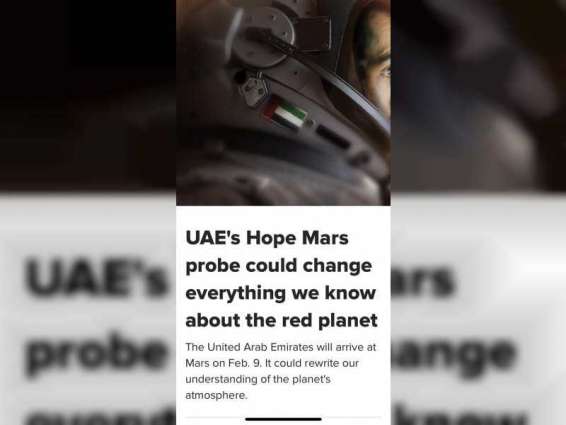DUBAI, (Pakistan Point News - 03rd Feb, 2021) Hope Probe, the UAE's first spacecraft bound for Mars, is already catching global media attention, as the countdown has begun for the first-ever Arab interplanetary mission to enter into Red Planet's orbit.
"July 2020 was a huge month for Mars. Taking advantage of its nearby position in orbit, three missions departed the Earth on a seen-month journey to the red planet. Now those spacecraft -- NASA's Perseverance rover, the Chinese space agency's Tianwen-1 and the United Arab Emirates' Hope -- are arriving at their destination. They're poised to uncover the secrets our celestial neighbor hides within its atmosphere and barren plains and may even reveal relics of ancient life on the planet's surface," said CNET, an American news & media website.
"The intent was not to put a message or declaration to the world. It was, for us, more of an internal reinforcement of what the UAE is about," the global media website quoted Sarah bint Yousif Al Amiri, Minister of State for Advanced Sciences, Chair of the UAE Space Agency, as saying.
The satellite, which launched from Japan in July, will study the connections between the red planet's lower and upper atmosphere and examine the causes behind Mars leaking hydrogen and oxygen into space. After achieving its orbit around Mars, it'll collect data for two years. There's also an option to extend the mission to 2025.
"It's no coincidence Hope will arrive at Mars the year the UAE celebrates its 50th anniversary. The mission is an act of resilience for the young nation. When the UAE announced in 2014 it would launch the Hope Mars Mission, it was a tumultuous time for the region," it added.
"In the region, members of that younger demographic are demanding new opportunities from their governments. The Hope Mars Mission (also called the Emirates Mars Mission) seems like the perfect way to offer that. Ninety percent of team members are 35 and under.
"There's also been a boost in space exploration-related jobs throughout the country. Universities have actively recruited faculty for positions related to Mars and planetary science, while the UAE Space Agency, created with this mission, has generated new jobs for overseeing programs within the nation. The Emirati team at the Mohammed bin Rashid Space Centre has grown from 70 people in 2015 to more than 200 today."
The renowned website added that it was very important for governments and nations to provide opportunities for youth and to provide them with a beacon of hope; and this,combined with the UAE's push to diversify its economy made a Mars mission a compelling choice.
"International collaboration is a critical element of the Hope Mars Mission. The UAE is working with the University of Colorado, Boulder; the University of California, Berkeley; and Arizona State University on the mission."
The probe will carry three scientific instruments. First is the Emirates Exploration Imager (EXI), a camera that can capture and send high-resolution images back to Earth. The Emirates Mars Infrared Spectrometer (EMIRS) will study temperature patterns, ice, water vapor and dust in the atmosphere. And the Emirates Mars Ultraviolet Spectrometer (EMUS) will study the upper atmosphere and traces of hydrogen and oxygen further into space.
Throughout history, international collaborations like this one have given space exploration a leg up, even when political relations between nations were lukewarm. At the height of the Cold War, the US and Soviet Union embarked on the 1975 Apollo-Soyuz Mission. This joint space flight became the impetus for future collaborations. And the International Space Station has notably brought together a plethora of nations including the US, Russia, Japan, many European nations and Canada.
Philip Christensen, principal investigator of the EMIRS on the Hope orbiter and professor of geological sciences at Arizona State University, was quoted by the website as saying international cooperation is critical. "It not only helps mitigate the challenges and expenses of Mars exploration, but it can advance our understanding of worlds beyond.
"Space has always seemed to be an area where nations could put aside their differences and realize there are ways we can work together, diffuse tensions and learn a little bit more about each other," Christensen says. "Many countries are starting to look at international partnerships as the wave of the future. This is how Mars exploration should be done."




